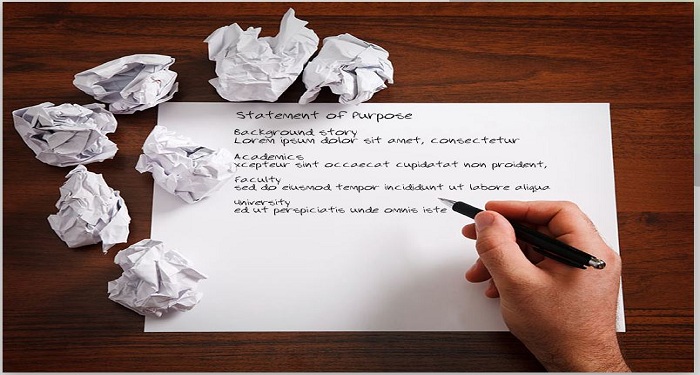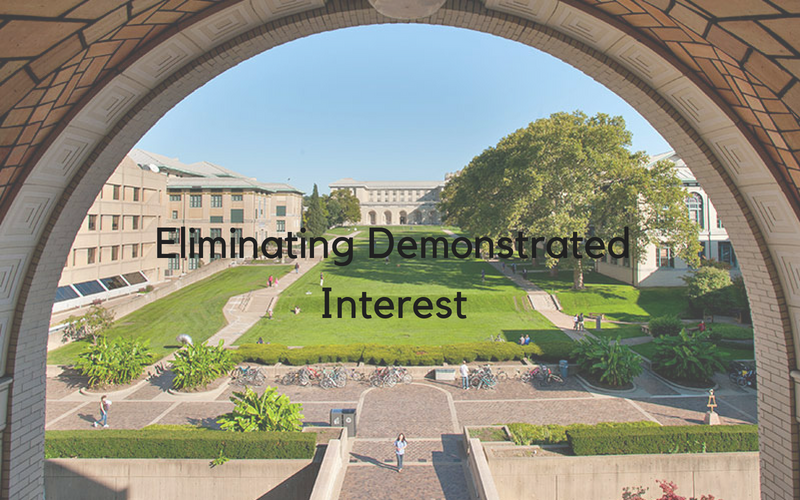
It is important that you follow a specific strategy when it comes to drafting your statement of purpose. Though most students write whatever comes to their mind, or whatever they see on the internet, you are not most people. You would want your statement of purpose to sound brilliant, and original. And for that, you’ll need some strategies.
1. Write Stories.
Not Statements If given a choice, would you prefer reading a novel or a newspaper? A novel, without a doubt. Do you know why? Because while a newspaper gives you mere news and some eye-catching headlines, a novel tells you a story; a beautifully written piece of literature that you will be emotionally connected to. It brings those human feelings out of you and involves you in its storyline. You imagine yourself in place of the narrator/character, and understand why he/she has done that or taken such decisions. We remember stories much easier than statements. Because stories connect to us, statements don’t.
For example, most people say this:
“I used to work in a multinational software company in the development team, and I had to do the same job every day: code stuff. There was nothing new for me to learn at work, and there was nothing very exciting about going to the office. One day I decided that I had to get out of there, so I applied to college to study higher courses and get a better job.
” Doesn’t that sound like most stories? Albeit, a very normal story? Instead, how about saying this:
“Late in the night on Monday, I had found myself in the middle of a deserted office, and fifteen thousand lines of code. Full of caffeine in my bloodstream, and an empty life beyond the office, I realized that the computers started coding my brain, and controlling my life. No longer wanting to let the machines feed on me, I decided that college would be my salvation.” Both the stories come about four lines. But which narrative do you think will keep the admissions committee reading? Which story do you think will be remembered by them even after reading 5000 applications?
Think again. Do you want your statement of purpose to read like a novel or a newspaper? If the former is your answer, then you need to put in a lot of effort to tell your story. Think about ‘why’ you want to study what you want to study. Is there a strong reason behind it? Is the reason emotional, economical, or any other? Think hard, and you will find a connection. The reason might not seem obvious in plain sight, but when you think hard enough, you will understand that there is a strong reason why you want to study a particular course/degree.
Now, when you have found this strong reason, tell it as a story. Write a short, but great narrative about what made you make this choice. About why you have chosen to study this course at this university. Impress the committee with your creative storyline, and you will reap the benefits big time.
2. Quantify Your Stories
Even though we asked you to write a story, you will have to remember that your story should not read like a thesis. It should rather serve as the best source of information about you. And when it comes to information, numbers play a key role. Your story should be not only qualitative but also quantitative. Which means, your story must contain measurable quantities instead of just stories, so the reader can understand the depth of it.
For example, if you have worked for a local NGO teaching math to primary kids, you could say:
“During my engineering days, I helped a local NGO by joining as a math tutor, where I taught basic math concepts to school children.”
Now even though this sounds really good, it doesn’t give the reader the entire picture and they certainly do not know how much of an impact you made on those children. So, you could change that bit to something like this: “During my second year of engineering, I joined ‘Teach Math’, a local NGO, where I was a part of the Math tutoring team. For a period of 10 months, I taught basic math like algebra, geometry, and arithmetic to more than thirty 5th and 6th grade students. And every single student I taught to, secured an A in math that year. I’ve never been prouder in my life.”
Do you see the difference? These numbers suddenly give a whole new perspective to the readers, and their respect for you is suddenly multiplied. That’s the power of numbers; they add authenticity, and authority to your stories. If you can quantify your stories properly, and show the results instead of just actions, the committee will not forget your name. You can use the same strategy for the rest of your story, no matter what it is about. Whether it is a research project you did, or a college fest you organized, or a college sports team you led, whatever it is, add numbers to your stories, and make them sound more realistic and more beautiful.
3. Be Specific
You have to make sure that whatever you say in your statement of purpose, you need to be very specific with it. Don’t just say something because you think it will impress the admissions committee.
Whatever you say, you have to really dig into details. Be introspective. Don’t just say “I chose this degree because I love this field.” Explain clearly why you love this field, what made you decide that you want to work in this field for the rest of your life, what skills you are trying to amass, why it completes you as a person, etc.
Don’t beat around the bush like you normally would, when you talk to your friends. Don’t use ideal sentences like ‘I want to change the world’ or ‘I want to find my inner self’ or any of those cheesy lines. Just be straightforward and always to the point, but not so much as to come off as arrogant. Find your reasons and then find a nice, memorable way to say it.
Grad school admissions officers require the statement of purpose not just because they want to find about you and your dreams. More importantly, they want you to think for yourself, as to why you are taking such a life-changing step; why you think this is the best thing that can happen to you; and why you think you truly need it to succeed in life. The ‘why’ is always profoundly important, and also an extremely difficult question to answer, which is why, if you can find answers to all the whys, then you are almost in.
4. Customize Your Essay
One of the biggest mistakes students make is to prepare a basic template for their statement of purpose, and if they are applying to more than one university, they simply change the relevant names and details. But the rest of the statement is an exact copy.
This is never a good idea because though they might seem quite similar to each other, every university is vastly different from the others. Each of them has a diverse set of characteristics that define them, and their cultures, methodologies, visions, values, mottos, strengths, weaknesses, etc., vary greatly. These things are much more important than the departments, or university rankings, or a number of Ph.D.’s or other materialistic qualities. So, if you are applying to multiple universities, you need to factor in all these qualities of every university and customize your statement accordingly. Mere changes in names and details won’t suffice. You need to tailor your essay such that the admissions officers think you will fit in well into their community. Remember, every student community is like a family, and if you give hints that you cannot fit into a family or their culture, you may not be welcomed easily.
Speaking of cultures, different countries obviously have different cultures, but even a big country like the US has different cultures in different parts of the country. So, before you begin writing, try and research the general culture within the region in which your target university is, and learn something about it. It may also help in aiding your decision process; if a culture doesn’t attract you much, then there’s no point in wasting an application.
5. Use a Formal But Conversational Tone
Nearly all statements or essays come under two categories: The super formal, and the super friendly. The first category is when you write a statement of purpose that is so formal, it looks like you are writing to your lieutenant in the military. The second one, of course, looks like a casual email to a friend.
Now, when asked which one seems like a better choice, most students say the formal way is the way to go, and super friendliness is a big no. And still, a minor set of applicants think they can outsmart the admissions committee by sounding friendly, welcoming, and funny. But, on further reflection, you would understand that neither of the approaches is ideal. And you are right, neither of them is right. Like we talked about it already, your statement of purpose should read like a novel: slightly formal language, but still a tinge of fun and uniqueness.
That is what you need. A conversational tone is the best and the safest way to go. Write like you are talking to someone, but avoid using casual language. Imagine you are talking to your dean or the director of your college. What would your language be like? That’s how your statement of purpose should sound. Now, occasional humor is okay, but you shouldn’t try to sound too funny or too smart. No intentional jokes or funny lines should find their way into your statement. After all, it’s a statement of purpose, and the purpose is to pursue a graduate degree, not to impress people with your sense of humor. So, if what you write brings a smile on the readers face, then it’s perfectly alright. But it shouldn’t make them throw away your application because you didn’t seem serious enough to them.
6. Decide How You Want To Portray Yourself.And Learn How to Portray Indirectly.
You must see that the statement of purpose serves as a medium to convey your attitude, your personality and your character. Alright, those are some heavy words, and it can actually be difficult to them on paper. So, what you can do is, learn what your statement of purpose should portray you as, in terms of a few criteria, which tell the admissions committee that you are: Very passionate about the field of study you have chosen. An Intelligent student who can withstand the academic workload of a graduate program. Well-prepared academically and personally, and eager to study new courses. Able to take on the challenges of studying at an international graduate school.
Able to build and maintain a good rapport with professors and fellow grad students. Able to finish the graduate degree within time, and graduate with a good percentage. A potential remarkable representative of that grad school in your future career. A successful alumni of the grad school who in the future can help in recruiting graduates. A responsible alumni who in the future will help raise funds for the grad school, to spend on research, infrastructure, facilities, student scholarships, etc. These are basically the parameters that grad school admissions officers look at, when they decide who is joining their class. Now, I know that the statement of purpose can only be as long as 1000 words, and that there’s quite a lot to cover in that little space.
This is where your writing skills should come in. You simply can’t just go ahead and write “I am very passionate about the field of study I have chosen.” That is the last thing you would want to write. What you should instead write is, a sentence that indirectly means the same. You will have to choose your words wisely so as to indirectly communicate your “passion”. You can use brief examples to show why you are so passionate about it. For example, you can say something like: “My grandfather was a car mechanic.
I remember when I was nine, he took me to his garage for the first time and showed me how he could repair my damaged bicycle so I could ride it again. When he passed away a few years later, he left me the entire garage. It was a turning point in my life. Some of my best days were spent inside the garage, where after coming back from school, I tried fixing various appliances in the house. That was what led me to choose to be a Mechanical Engineer.”
The above paragraph speaks volumes about you as a person and your passion for Mechanical Engineering without you actually saying it. Any admissions officer in the world wouldn’t reject an applicant with such a deep reason, and such a wonderful story behind him/her. Now, remember, you don’t have to lie. Try and remember stories from your life that have shaped your decisions. And connect them beautifully to your goals and dreams. Now similarly, your “intelligence” can be conveyed by how you write. The quality of the statement of purpose, the organization, expression, etc. of your statement tells how intelligent you are. Demonstrating knowledge of the field, and using related jargon shows that you are “well-prepared”.
Showing what you have done already describes your ability “to take on the challenges of grad school”. Your grades and your previous performance prove your ability “to finish the graduate program in time”. Being a “future remarkable alumni” can be implied by your being a commendable representative of your previous institutions, like your high school, or undergraduate school. Similarly, you will have to try and represent all the qualities mentioned above in an indirect, but powerful way.
7. Don’t Create Stories. Be Yourself
Because we asked you to write stories, there would naturally be an inclination to “create” stories out of thin air. Do not do this at all. Write great stories only if you have great stories. Some people might come from normal backgrounds, who had normal lives, and probably didn’t achieve anything spectacular. It’s completely okay. If you don’t have anything great to write, don’t write it. Be normal, and write normal stories. It is better to be normal than to pretend to be someone you are not.
The admissions officers are expert psychologists, and they can spot a true applicant from a false applicant with just one reading. So, you will badly hurt your chances of getting into your dream school if you try to be someone else. Just be yourself, and write only about the things that have happened to you, and the things that you are passionate about. Saying “I love research” just because you think they will like it, isn’t going to help you a lot. Whatever you say just for the sake of it, won’t appeal much to the committee, as they would look for relevant evidences in your stories and in your past. So, don’t even think about fooling the committee with a false storyline. Try and be yourself throughout the essay.
8. Address Your Problems
The Statement of Purpose is a great opportunity for you to address some of your problems. If you have had any problematic academic background, or a gap year in your career, or if you had any work-related problems, you can address them on the statement of purpose in order to reassure the admissions committee. You must try and be as honest as possible, and talk about your problems in a matured manner. Instead of trying to defend yourself, you can point out the actual reasons that led to the problems, but more importantly, you should highlight ‘how’ you overcame the situation, and ‘what’ you have learnt from the experience. For example, let’s say that you got all C’s or all D’s in one semester. This normally isn’t the kind of academic profile a good grad school would want from you, unless there is a strong reason behind it. So, take some time and dedicate a few lines to explain whatever happened.
If you had a health problem during your semester exams, or if you faced any emotional setback during that time, if you experience any personal loss, or if you had to take up additional family responsibilities other than studying, you can mention that in your statement. But, more importantly, you should not forget to demonstrate how your grades have been steadily improving since then, and that you now have a decent grade-point average in the discipline. If you can spin this story well enough for the committee to empathize with you, then your story will enhance the admissions committee’s image of you as a matured student, with the abilities to “take on additional challenges” and “to finish on time”, even when things are against you.
9. Do Your Homework
This is one very important point you should exercise while you are writing a statement of purpose. You should be thorough with the details of all the universities you are applying to, and list down all the things you like about each university, before you write the essays. Most students simply write generic sentences like “I am impressed by the importance your university gives to research” or “I would like to study here because you have 100 Ph.D.’s and 20 Nobel prize winners.” etc. No, that is not how you do it.
The admissions committee knows how great their college is; you don’t have to remind them again and again. But, you should let them know what exactly you like about them, that you so badly want to be there. The specifics are really important. For example, you could say something like this. (Excuse the random jargon, it is only to give you an idea.) “I would fully utilize the resources that the Wallenberg Hall provides, as I am particularly interested in the field of molecular chemistry. The special 24/7 laboratories provided for student research on molecular processing is exactly the kind of opportunity I am looking for, as I could totally see myself working in the labs day and night.” And something like: “I especially want to study under Dr. Mark Adams, Ph.D., as I have been an avid follower and admirer of his work in the field of quantum chemistry, which is not only the field I would choose for my research study, but also is a topic that I am zealous about, personally. I would be more than honoured if I can earn a spot in his research group.” Do you see how professional it sounds? Such things show how well prepared you are, and how eager you are to study at that university. Now, to write something like this, you obviously need to do lots of research both online and offline, and be very thorough about the college, its facilities, courses, and professors. Yes, it is very difficult, but believe me, it is completely worth all the hard work.
10. Proofread, Edit, and Re-edit.
Ask Friends and Family To Grade Your Essay Another mistake students make is, they try and keep their essays to themselves. Maybe they are shy, or maybe they think their friends and family aren’t necessarily experts on the subject. So they think there’s no point in asking friends and family to critique on their essays. Wrong. Your statement of purpose speaks about you as a student, as an individual. Yes, there is technical slang involved, and yes your family members may not be experts on that. But, they sure are experts on ‘you’. Which is exactly why you should approach them. They can not only give you additional points to add, but they can give you valuable stories about your childhood or schooling days, which you probably won’t remember. Plus, it’s very easy to say something about others, but at the same time, it’s painfully difficult to describe yourself to someone.
Which is why someone very close to you, like friends and family, can describe you accurately. You will get new perspectives on your stories, which sometimes are better than your own versions, and including them in your statement of purpose will do you a lot of good. Also, remember to proofread your statement time and again, and keep on re-editing content until you, your family and friends think you have the best statement in the world. Remember that your statement of purpose is a literary picture of ‘you’ as a person, and it is representing on your behalf. So, make it a top priority to avoid typos, misplaced commas and semicolons, overused quotes, being too wordy, using too many complex words and sentences, and being too straightforward. Be careful. Be a perfectionist when it comes to writing. It shows how much you care about going to a particular college. And, once you are done with everything, do not forget to ask your friends and family to grade your statement of purpose, and ask them to criticize it accurately, so you can avoid submitting a less than perfect copy of your statement.
11. Take Advice From Professors.
If you know a professor at your undergrad institution, don’t hesitate to approach him/her for advice regarding your statement of purpose. They are of course very experienced prospects, and they might have seen thousands of statement of purposes and students in their careers. So, it wouldn’t hurt to ask for their opinion. Plus, since unlike your family, they are technically sound, they can also provide you valuable insights on how to project your technical expertise and project works in the statement. After all, a professor knows what another professor looks for in a prospective student, so it would only help if you approach your college professors. And, if they are really close to you, you can also ask them for a really good letter of recommendation. So whichever way you look at it, there are only benefits for you.
 On July 19th and 20th, the UCLA Anderson School of Management will host the 2018 BIT Conference. This year’s conference will focus on an “industrial revolution for services,” in particular the myriad ways in which AI, IoT, and data analytics will affect the service sector.
On July 19th and 20th, the UCLA Anderson School of Management will host the 2018 BIT Conference. This year’s conference will focus on an “industrial revolution for services,” in particular the myriad ways in which AI, IoT, and data analytics will affect the service sector.













